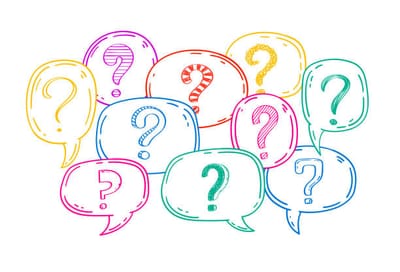Short Inquisitions #3: Why is Language so Bad at Conveying Pain?
Short inquisitions is a series of blog posts where I spew out my questions and thoughts, hoping to retain an ever-curious soul.
A few weeks ago, I read John Green's "The Anthropocene Reviewed." There's a part (or a couple) that talks about how bad English, or language for what it's worth, is horrible at conveying pain. It made sense to me, but I didn't give it much thought. It's been sitting in the back of my head, though, and it's bothering me, like the fly you can't ever seem to kill.
Think about it. For example, let's say you're in physical pain: you broke your arm because you fell off the zipline in your school playground. You're brought to the doctor's, and they ask you, "On a scale from one to ten, how bad is your pain?" Sometimes, you get the privilege of seeing some accompanying faces.

But even then, what do these faces mean? What does "hurts even more" mean? This rating scale is undeniably subjective. If you retreat to using words, the descriptions become even more ambiguous. It's "excruciating pain," or it's "horrible." That doesn't really tell you anything. Of course pain is horrible, bad, dreadful, etc.
It seems like there have been attempts to quantify pain using brain scans, but they haven't achieved a working pain scale yet. IBM appears to be using AI to measure chronic pain, but those results aren't published either. Maybe it's kind of good that human experiences can't be reduced to a mere number. I find a bit of solace in technology's shortcoming, at least for now.
What about emotional pain? I abhor emotional pain so much more than physical pain—there is no medicine to relieve it. (I guess you can get drunk and do drugs, but I prefer to stay away from that.) Usually, emotional pain comes with a feeling of loneliness and a weird sense of uniqueness: no one else understands how you're feeling. When you try to convey your feelings, you're left with "I'm alone," "It hurts," or something of the sort.
When we've been struck down and need help, hope, or empathy, we're at a loss for words. How do you describe what you're feeling?
This ineptitude of language irks me. If we had the ability to accurately tell others how we're feeling, maybe those that have contemplated suicide would've been more easily deterred; maybe those that have gone through breakups would've felt less lonely; maybe we could all understand each other just a little bit better.
So, after pondering humanity's shortcoming with language, I'm left to wonder: How can we claim we're so advanced when we can't begin to communicate our pain?
No spam, no sharing to third party. Only you and me.




Member discussion